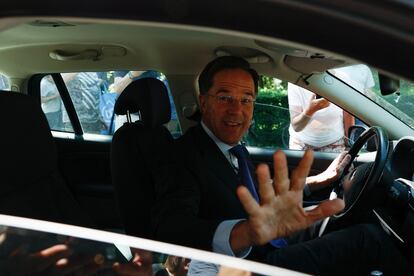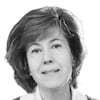Dutch parties prepare for unexpected elections in November
The Peasant-Citizen Movement (BBB), a populist agrarian party, may become the second force in Parliament, according to polls, which give it 23 seats compared to the only one it now holds


The government led since 2010 by Mark Rutte, the now-resigned prime minister of the Netherlands, has lasted 543 days. On Friday night, differences of approach on immigration policy precipitated its collapse. It was the end of a center-right coalition whose foundations were not solid and which had suffered more than one crisis since it was formed last January after 10 months of negotiations between four formations. The parties are preparing for the unexpected electoral race of elections to be held in November.
Rutte gave a blow on the table when his demands to tighten the asylum policy were not accepted, a commitment he had made at the last congress of his party - the right-wing liberals (VVD) - where he promised to reduce this migratory flow. However, the proposal to limit the entry of family members of war refugees already received and to make them wait two years for reunification was rejected by two of his partners, the Christian Union (CU) and D66, left-liberals. Although the breakup of the Executive has been finally consensual, it has surprised the hardness in a politician who has made of the negotiating skills and the capacity of political survival his own brand. This Saturday, Rutte met with King William to inform him of the fall of the government, a conversation about which he made no statements: “These are confidential meetings”.
The next step will be a debate on the resignation of the government in Congress before its dissolution, scheduled for Monday. It will then open a race to the polls favorable to the rise of the Peasant-Citizen Movement (BBB), a party that represents agrarian populism and already holds a majority in the Senate. If it maintains the pull of the voters, it is possible that the Executive will end up leaning further to the right after decades in which the center has marked Dutch political stability.
Immigration control has divided the Dutch Executive for months, so what has now precipitated the split? “Many people expected something like this to happen in the autumn or maybe during the winter. Now it’s all speculation. Rutte was obliged to meet the demands of his party and he will be able to say that he has gone even further. That they can’t do without him. But I am surprised to have seen him run so early as a candidate,” says sociologist Paul Schnabel. On Friday night itself, during the press conference following the government’s fall, the prime minister seemed to give himself some leeway by saying that he had “energy and ideas” to remain in the front line, but that he would consult with his party.
Columnist Petra de Koning, who has written a biography of Rutte - the country’s longest-serving leader with more than 12 years in office, second only to Hungary’s Viktor Orbán in the EU - finds that the attitude during the negotiations on the reunification of war refugee families “was not this politician’s style.” “He was demanding to the point of stubbornness and then changed his attitude. His group has pressed him on this issue, and once he has complied everything is conjecture about his future,” he argues. In his opinion, it would not be strange for Rutte to take a step back as leader of VVD, “but with him you never know.”
In the course of a year and a half of the legislature, there have been other critical moments. Last February, a parliamentary committee concluded that profits from the Groningen gas field (in the north of the country) had been prioritized over the safety of the population. Extraction causes earthquakes, and the coalition held out in part because the field is scheduled to be shut down in October of this year. In addition, farmer protests over nitrogen emission cuts have set the countryside on fire. In 2022, there were mass tractor marches, and the image of the Dutch flag hanging upside down in meadows and on roads - also on many citizens’ balconies - proved a powerful symbol. It is a wound that remains open in a country with 52,000 livestock farms, of which about 11,200 will have to close, according to Finance Ministry estimates. Although the government has not collapsed, plans to reduce emissions from livestock farming have been delayed. It was precisely out of these protests that the BBB party and its leader, Caroline van der Plas, emerged.
On paper, for the Christian Union, the smallest of the four parties in the now-broken coalition, few losses are predicted in the early elections. “They have only five seats in Congress [out of a total of 150] and a loyal electorate. That is why they have become strong on the ethical aspect of the problem of family reunification of refugees,” Schnabel points out. Meanwhile, the Christian Democrats (CDA), who did support Rutte in the government, are not getting back on their feet, and part of their voting base, which is in the countryside, is turning to the BBB. Both they and the left-liberals (D66) are facing possible setbacks at the polls. The extreme right of Geert Wilders and his Party for Freedom (PVV) is also warming up. Today it is the third force in seats - it has 17 and the polls predict 15 for the moment -, and this Friday Wilders said he was willing to work with Rutte’s VVD. “We must overcome egos,” he said.
As for the VVD, polls conducted by Ipsos a week before the fall of the Executive gave it 28 deputies (it now has 34 seats). For the BBB, they estimate 23 seats. A dizzying increase, since it now has only one and would become the second national party. “Rutte may believe he has a large part of the electorate behind him, but it is notorious that people often get tired of leaders who have been in power for a long time. Think of former German Chancellor Angela Merkel. Or the problems of French President Emmanuel Macron,” says the expert. On the other hand, the BBB leader supports migration restrictions and has suggested an annual cap of 15,000 asylum seekers, but at the same time says that those who need it for humanitarian reasons are welcome, although they should not cause social problems: “She is ambivalent because she has not had to answer the question of how many and how. For now.” In 2022, asylum applications rose by a third to 46,000, according to the Central Statistical Office. The government estimates that this year they may rise to 70,000.
During the upcoming election campaign, Caroline van der Plas will boost her image as a strong and oratorical Dutch woman. She contrasts with the aloof aura attributed to Sigrid Kaag, left-liberal finance minister (D66), who swapped diplomacy for politics and has not decided on her political future. “In this context, social democracy and the GroenLinks environmentalists can make a common front to try to attract the left-wing electorate,” says Schnabel. They have already done so in the Senate, where their alliance has 14 seats (out of a total of 75). They are only outnumbered by the BBB, with 16.
Sign up for our weekly newsletter to get more English-language news coverage from EL PAÍS USA Edition
Tu suscripción se está usando en otro dispositivo
¿Quieres añadir otro usuario a tu suscripción?
Si continúas leyendo en este dispositivo, no se podrá leer en el otro.
FlechaTu suscripción se está usando en otro dispositivo y solo puedes acceder a EL PAÍS desde un dispositivo a la vez.
Si quieres compartir tu cuenta, cambia tu suscripción a la modalidad Premium, así podrás añadir otro usuario. Cada uno accederá con su propia cuenta de email, lo que os permitirá personalizar vuestra experiencia en EL PAÍS.
¿Tienes una suscripción de empresa? Accede aquí para contratar más cuentas.
En el caso de no saber quién está usando tu cuenta, te recomendamos cambiar tu contraseña aquí.
Si decides continuar compartiendo tu cuenta, este mensaje se mostrará en tu dispositivo y en el de la otra persona que está usando tu cuenta de forma indefinida, afectando a tu experiencia de lectura. Puedes consultar aquí los términos y condiciones de la suscripción digital.








































